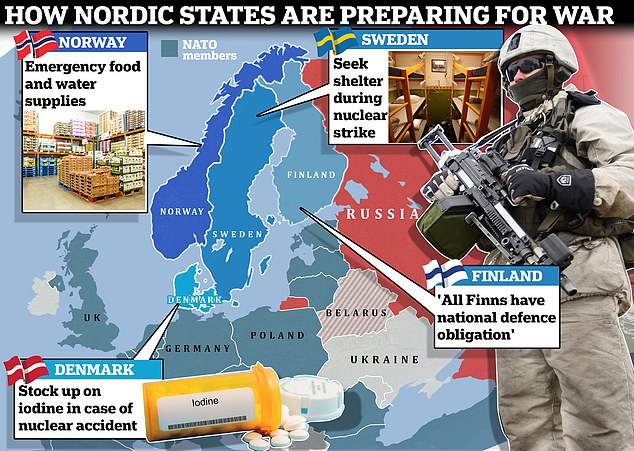Table of Contents
Nordic nations are instructing their citizens to prepare for a possible attack from Russia, sending leaflets and emails to millions of homes with advice on how to seek shelter and stockpile supplies as Moscow threatens nuclear war.
The 2022 invasion of Ukraine by Vladimir Putin’s forces led Sweden and Finland to increase defense spending and abandon decades of neutrality to join NATO.
Troops from across the bloc are carrying out drills in Lapland, 70 miles from the Finnish-Russian border, with 28 nations participate in the largest artillery exercises in NATO history.
Now, 1,000 days into the Ukraine conflict, the alliance’s newest members have issued advice on how to survive in times of war, alerting citizens to the potential threats they could face and how to address them.
Finland has reminded its citizens of their “national defense obligation”, while Sweden has produced a detailed guide on how to seek shelter and what to do in the event of a nuclear attack.
Their instruction manuals follow similar advice issued by their Baltic neighbors, Norway and Denmark, which published checklists of foods and medicines that citizens should have on hand.
Vladimir Putin today rewrote Russia’s nuclear doctrine to suggest it could trigger Armageddon if Ukraine attacks its territory with NATO-supplied weapons.
Moscow appears to be taking the possibility seriously, with reports today that it is launching mass production of mobile nuclear shelters.
As Russia and NATO members prepare their citizens for war, both logistically and psychologically, MailOnline analyzes the advice issued to the populations of four Nordic countries.
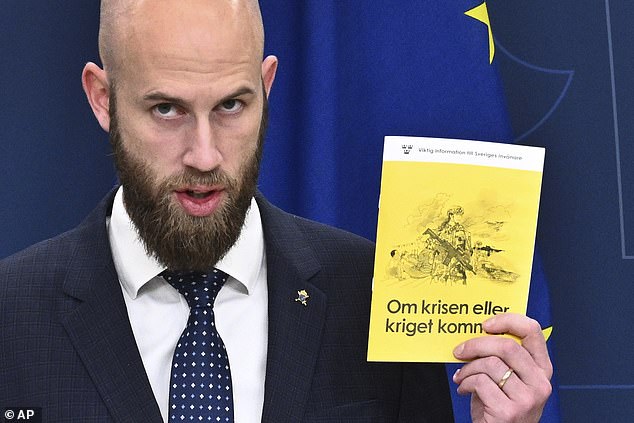
Swedish Minister of Civil Defense Carl-Oskar Bohlin presents the new version of the brochure “If crisis or war comes”
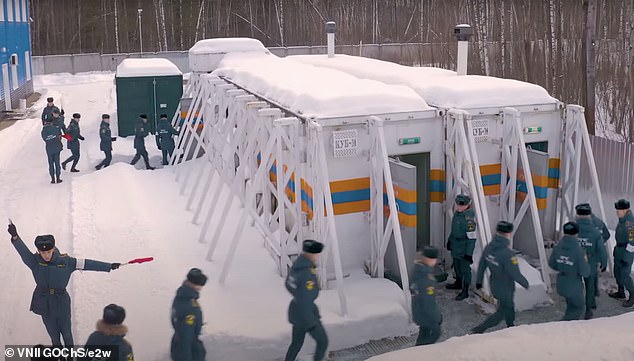
Russia has started mass production of KUB-M mobile nuclear shelters
Sweden
Currently, more than five million Swedish households receive bright yellow leaflets titled “If Crisis or War Comes.”
The brochures, sent by the Swedish Civil Contingencies Agency (MSB), contain information on how to prepare for emergencies such as wars, natural disasters, cyber attacks and terrorism.
‘An insecure world requires preparation. The military threat to Sweden has increased and we must prepare for the worst: an armed attack,” says its new introduction.
In an extract dating back to advice given by governments during the darkest days of the Cold War, people are informed about the risk of nuclear weapons being used.
‘The global security situation increases the risks that nuclear weapons could be used. In the event of an attack with nuclear, biological or chemical weapons, take cover as in an air attack,” the brochure advises readers.
‘Shelter provides the best protection. After a couple of days, the radiation has decreased significantly,” he warns, adding that people will be warned of the attacks by radio and, if there is no better option, they will have to go to the basements or the subway.
Another message, which appears in the middle of the booklet in the updated version, reads: ‘If Sweden is attacked by another country, we will never surrender. Any information indicating that the resistance must cease is false.’
Last month, Sweden’s Defense Department described Russia as “the main threat to Sweden,” adding that it constitutes “a threat to the entire (NATO) alliance.”
The risk of a Russian attack on the country “cannot be excluded,” Pal Jonson added in an interview with Politico.
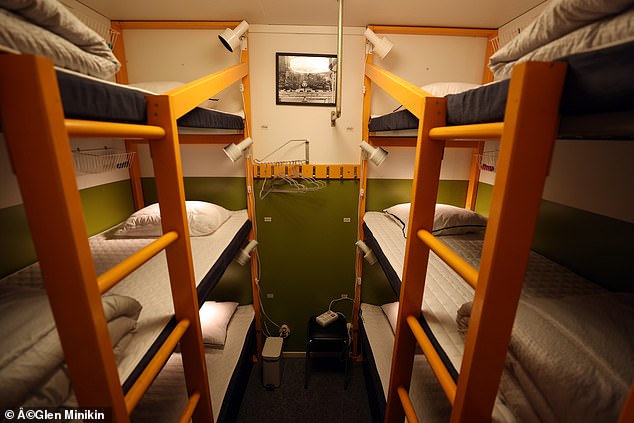
A Cold War bunker in the remote Swedish village of Ljungby
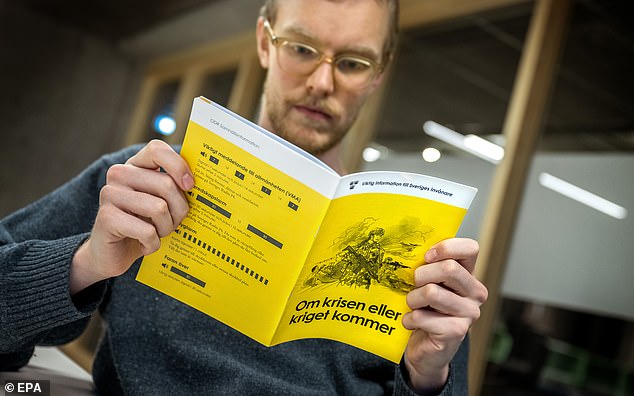
A man poses with the 2024 version of the brochure ‘If Crisis or War Comes’ in Stockholm
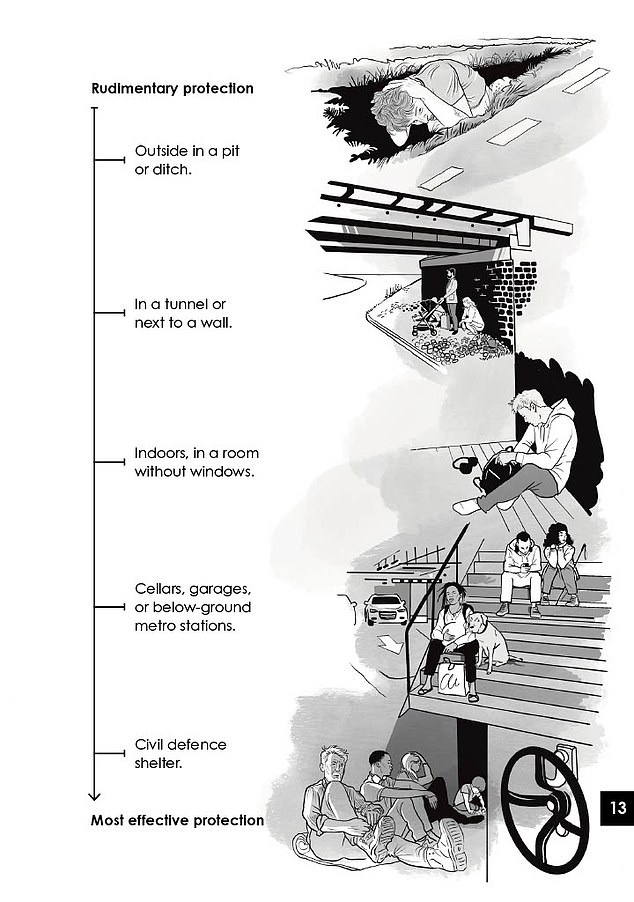
The illustrated guide offers tips on how to get to shelter in different emergency scenarios.
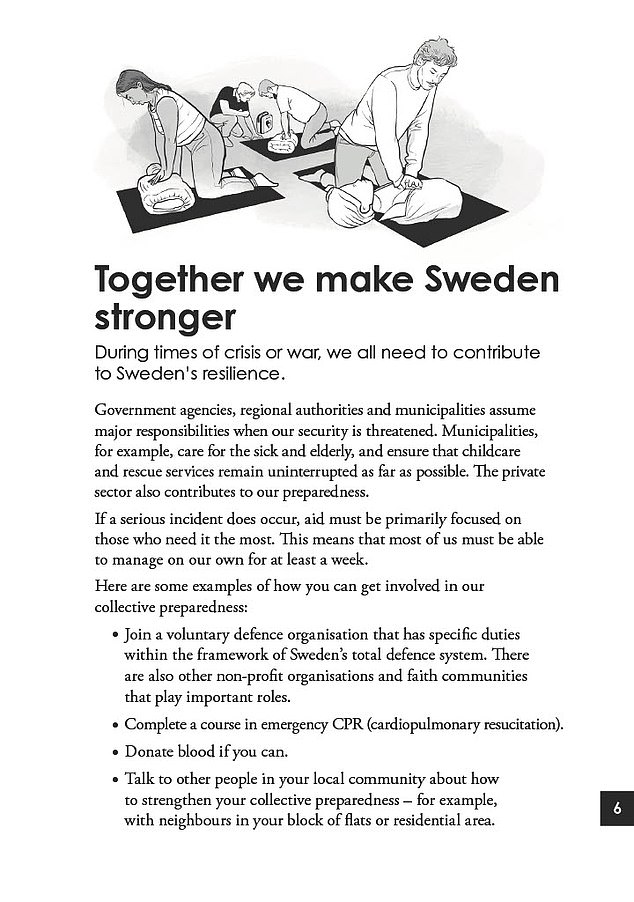
‘If Crisis or War Comes’ guide advises Swedes on how best to help their country prepare
Earlier this year, the commander-in-chief of the Swedish army, General Micael Byden, warned Swedes to “mentally prepare for war.”
‘The situation in the world has worsened drastically in recent years. “A war is being fought in our vicinity,” the Swedish civil contingency agency said in publishing the new guidelines this week.
“If we are attacked, we must all help defend Sweden’s independence and our democracy.”
Finland
Meanwhile, the Finnish government has published a digital brochure to prepare citizens for “incidents and crises.”
Helsinki said it decided not to print a copy for each household, as others have done, as such a task would “cost millions.”
They added that a digital version could be updated more easily, should new threats emerge.
In a section addressing military conflicts, he assures people that the country “has always been prepared for the worst possible threat, war” and that they are “well prepared for self-defense.”
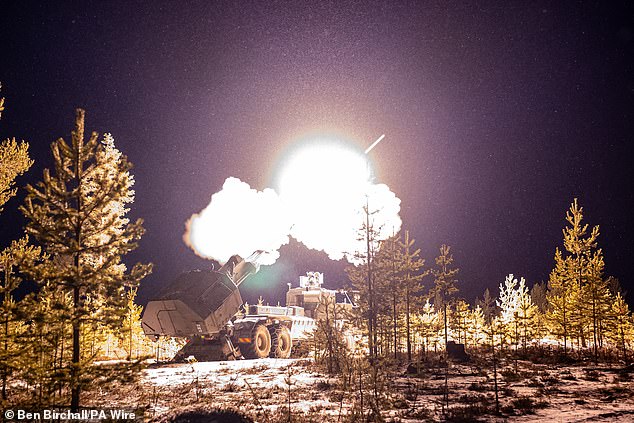
Troops from across NATO are conducting drills in Lapland, 70 miles from the Finnish-Russian border.
But the country, which requires its citizens to perform national service, also takes the opportunity to remind them that “national defense belongs to everyone.”
“All Finnish citizens have an obligation to defend their country and everyone plays an important role in the defense of Finland,” he says.
“Preparation is a civic skill in the current global situation,” said the head of Rescue Services at the Finnish Ministry of the Interior. “Knowing what to do in the event of an incident is a good foundation for societal resilience.”
Denmark
Earlier this year, Denmark’s emergency management agency announced it would email Danish adults details about the water, food and medicine they would need to survive a crisis situation.
He cites the “deteriorating security situation in Europe” as a serious threat to Denmark and says cyber attacks and sabotage are possibilities that people should prepare for.
The pamphlet advises that people should be prepared to “manage themselves for three days in the event of a crisis.”
This, he says, will allow authorities to “focus on stabilizing the situation and helping where the need is greatest.”
They recommend people keep plenty of water, food, medications and first aid kits in their homes.
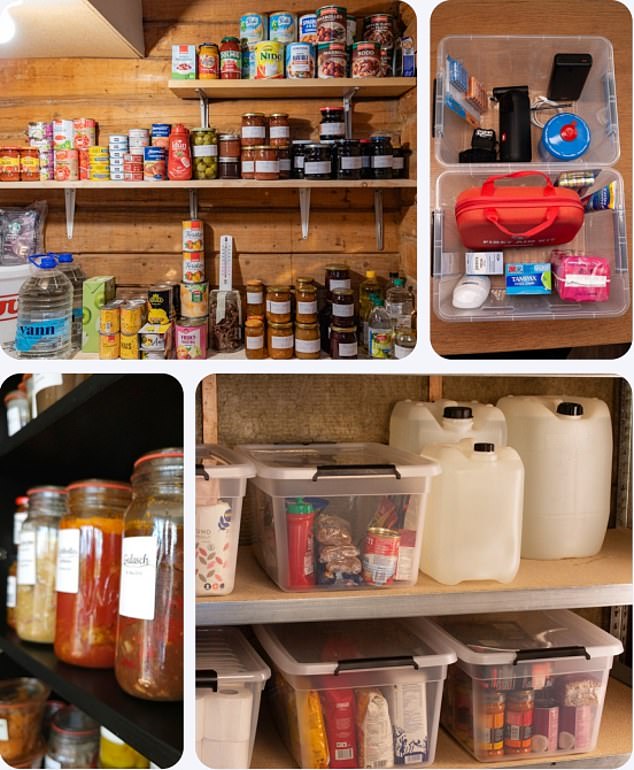
Danish authorities are urging people to keep plenty of food reserves in their homes in case
In the event of a nuclear accident, he says the most important advice is to stay home and listen to authorities.
It recommends that people carry a supply of iodine tablets to be used by people under 40 and pregnant and lactating women in the event of a nuclear accident.
Norway
Like their neighbors in Sweden, the government has recently sent Norwegians emergency preparedness brochures.
The brochures give them advice on how to manage on their own for a week in the event of extreme weather conditions, power outages and, “in the worst case scenario,” impacts on the country.
According to the Norwegian authorities, some 2.2 million copies of the brochure have been sent.
The advice was previously published in 2018, but this year’s updated version suggests authorities believe further preparations are necessary in the current climate of uncertainty.
The recommended preparation duration for self-preparation has been increased from at least three days to one week.
More detailed advice on topics such as critical understanding of the media and places to stay in crises.
Additionally, some completely new topics have been added: common personal preparedness and mental health in crisis situations.
The duration of self-preparation increases from at least three days to a week.
Iodine tablets (applies to children and adults under 40 years of age, pregnant or breastfeeding).
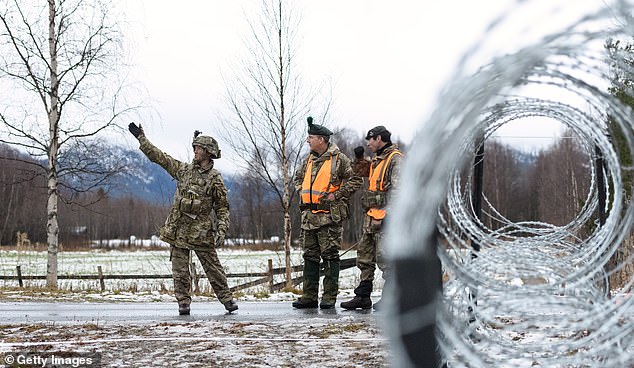
British Army soldiers on exercise with Norwegian forces in 2018 during a joint NATO drill
It comes after King Harald of Norway gave a stern warning in his New Year’s speech last year: ‘We cannot take peace and freedom, resources and the commons for granted.
‘We must stand guard! Norway’s preparedness is ultimately the sum of each individual’s resilience.’
Kathrine Kleveland, a Center Party politician, warned this month that her country faces increasing global threats that the government is dealing with.
“The world is changing with the various bloc formations and the balance of power between great powers like the United States and China,” he wrote in Nationen.
“The Russian invasion of Ukraine in 2022 has also created a security policy crisis globally and in Europe.”
The government, he said, is responding by increasing defense spending by about a third, intensifying Norway’s preparation for war.
“After the Cold War, many activities and measures related to so-called war planning within social security were discontinued and given lower priority,” he said. “The pendulum is now swinging.”

